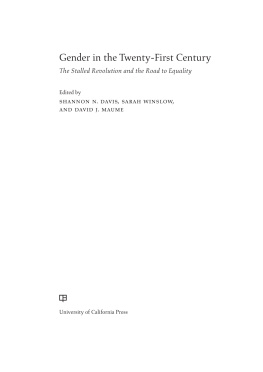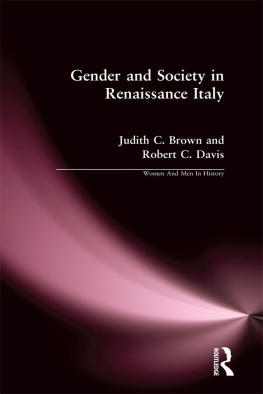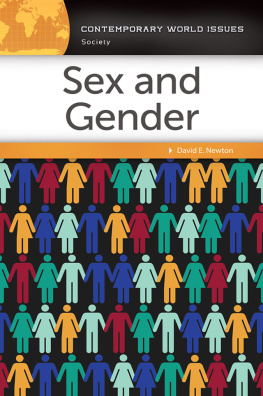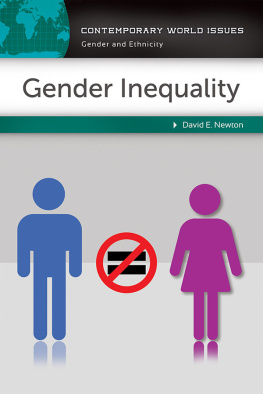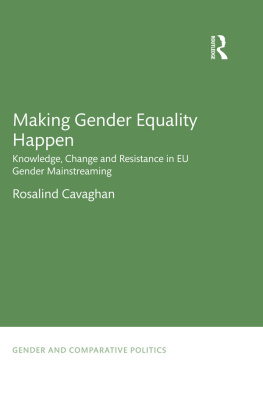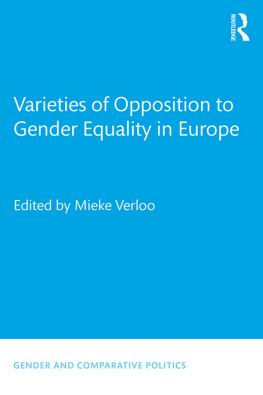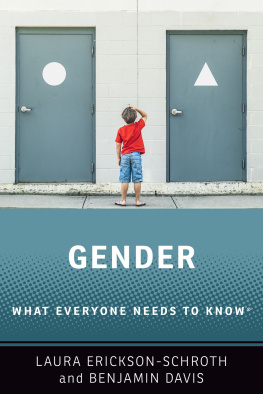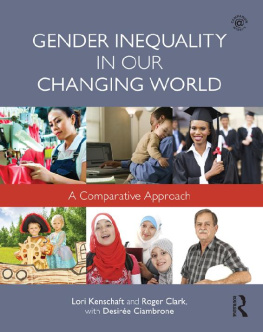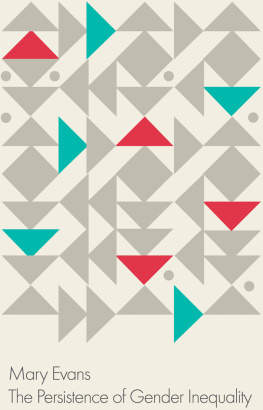Copyright 2017. University of California Press. All rights reserved. May not be reproduced in any form without permission from the publisher, except fair uses permitted under U.S. or applicable copyright law.
EBSCO Publishing : eBook Collection (EBSCOhost) - printed on 12/8/2022 10:45 AM via
AN: 1536268 ; Shannon N. Davis.; Gender in the Twenty-First Century : The Stalled Revolution and the Road to Equality
Account: ns075055
Gender in the Twenty-First Century
The Stalled Revolution and the Road to Equality
Edited by
SHANNON N. DAVIS, SARAH WINSLOW, AND DAVID J. MAUME

UNIVERSITY OF CALIFORNIA PRESS
EBSCOhost - printed on 12/8/2022 10:45 AM via . All use subject to https://www.ebsco.com/terms-of-use
University of California Press, one of the most distinguished university presses in the United States, enriches lives around the world by advancing scholarship in the humanities, social sciences, and natural sciences. Its activities are supported by the UC Press Foundation and by philanthropic contributions from individuals and institutions. For more information, visit www.ucpress.edu.
University of California Press
Oakland, California
2017 by The Regents of the University of California
Library of Congress Cataloging-in-Publication Data
Names: Davis, Shannon N., editor. | Winslow, Sarah, 1978- editor. | Maume, David J., editor.
Title: Gender in the twenty-first century : the stalled revolution and the road to equality / Edited by Shannon N. Davis, Sarah Winslow, and David J. Maume.
Description: Oakland, California : University of California Press, [2017] | Includes bibliographical references and index.
Identifiers: LCCN 2016056689 (print) | LCCN 2016059763 (ebook) | ISBN 9780520291386 (cloth : alk. paper) | ISBN 9780520291393 (pbk. : alk. paper) | ISBN 9780520965188 (ebook)
Subjects: LCSH : Sex roleUnited States21st century. | Sex role in the work environmentUnited States21st century. | Equality before the lawUnited States21st century. | Work and familyUnited States21st century. | Sex discrimination in employmentUnited States21st century.
Classification: LCC HQ 1075.5. U 6 G 464 2017 (print) | LCC HQ 1075.5. U 6 (ebook) | DDC 305.30973dc23
LC record available at https://lccn.loc.gov/2016056689
Manufactured in the United States of America
26 25 24 23 22 21 20 19 18 17
10 9 8 7 6 5 4 3 2 1
EBSCOhost - printed on 12/8/2022 10:45 AM via . All use subject to https://www.ebsco.com/terms-of-use
Contents
Gender as an Institution by Shannon N. Davis, Sarah Winslow, and David J. Maume
Theres No Such Thing as Having It All: Gender, Work, and Care in an Age of Insecurity by Kathleen Gerson
Community Colleges as a Pathway for Low-Income Women to Enter the Engineering Technology Workforce by Chrystal A.S. Smith
Separating the Women from the Girls: Black Professional Mens Perceptions of Women Colleagues by Adia Harvey Wingfield
True Love Had Better Wait, or Else! Anxious Masculinity and the Gendered Politics of the Evangelical Purity Movement by Sierra A. Schnable
Gender, Residential Segregation, and Military Enlistment Patterns by Allison Suppan Helmuth and Amy Kate Bailey
Conference Realignment and Its Impact on Women Student-Athletes by Earl Smith and Angela J. Hattery
Gender Parity on Corporate Boards: A Path to Womens Equality? by Martha Burk and Heidi Hartmann
Hispanic Inclusion at the Highest Level of Corporate America: Progress or Not? by Lisette M. Garcia and Eric Lopez
Work-Life Balance and the Relationship between Women in State Legislatures and Workers Schedule Control by Beth A. Rubin, Sabrina Speights, Jianhua Ge, Tonya K. Frevert, and Charles J. Brody
Black, Women, or Black Women: An Intersectionality Approach to Health Inequalities by Jielu Lin and Susan W. Hinze
Interactions between Gender and Immigration in Wage Inequality among STEM Workers, 19802010 by Erin M. Stephens, Joshua D. Tuttle, and James C. Witte
Queer Eye on the Gay Rodeo by DLane R. Compton
Unstalling the Revolution: Policies toward Gender Equality by Sarah Winslow, Shannon N. Davis, and David J. Maume
EBSCOhost - printed on 12/8/2022 10:45 AM via . All use subject to https://www.ebsco.com/terms-of-use
Figures
2.1. |
3.1. |
6.1. |
6.2. |
8.1. |
8.2. |
9.1. |
9.2. |
9.3. |
9.4. |
9.5. |
10.1. |
10.2. |
10.3. |
10.4. |
10.5. |
11.1. |
11.2. |
11.3. |
11.4. |
12.1. |
12.2. |
EBSCOhost - printed on 12/8/2022 10:45 AM via . All use subject to https://www.ebsco.com/terms-of-use
Tables
3.1. |
6.1. |
7.1. |
8.1. |
12.A. |
12.B. |
12.C. |
EBSCOhost - printed on 12/8/2022 10:45 AM via . All use subject to https://www.ebsco.com/terms-of-use
Acknowledgments
This volume was borne out of the collaboration that supported the 2015 Southern Sociological Society Annual Meeting, Stalled Revolutions? Gender Inequality in the 21st Century, with David Maume as president. Shannon Davis and Sarah Winslow cochaired the Program Committee tasked with shaping the intellectual contributions of the annual meeting. Many of the chapters in this volume are revised versions of papers presented at that conference. Shannon Davis was supported by a George Mason University Faculty Study Leave to facilitate the completion of the volume.
We are indebted to our colleagues in the Southern Sociological Society, especially the 2015 Program Committee, as well as those at George Mason University, Clemson University, and the University of Cincinnati for their support in the completion of this volume. Reviewers and editors of University of California Press provided valuable direction and feedback. In addition to our authors, we are grateful for the editorial contributions of M.C. Elias and Sarah Wagner (George Mason University) and the indexing work of PJ Heim of QMFindexing, made possible by financial support from the Charles Phelps Taft Research Center at the University of Cincinnati. We are also deeply appreciative of the support of our families throughout the organization and implementation of the 2015 Southern Sociological Society meeting and our subsequent work on this volume: Frank, Alexandra, and Miles (Shannon), Stephanie, Reeve, and Laken (Sarah), and Debbie (David).
EBSCOhost - printed on 12/8/2022 10:45 AM via . All use subject to https://www.ebsco.com/terms-of-use
1.
Gender as an Institution
Shannon N. Davis, Sarah Winslow, and David J. Maume
Marcia, age 18 , is a senior in high school, while her brother Mark, age 16 , is a junior. They live with their biological parents. Both are planning to attend college; Marcia has been accepted at the best liberal arts college in her state. She does well in school, but is so overscheduled that she is tired frequently, leading her parents to make comments about how she needs to worry more about how she looks each day. Mark does well in school, too, but his parents have been pushing him to be more involved in sports so he can look more well-rounded in his college applications. Being president of the Chess Club is important, they say, but he needs to show that he has athletic skills as well. Both Marcia and Mark have many friends, though neither has a steady dating partner. One of the key points of contention in their household is that they have the same curfew, even though Marcia is only a few months away from living on her own.

